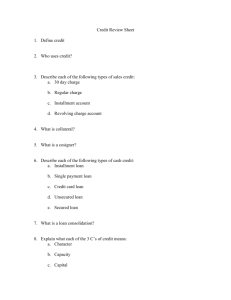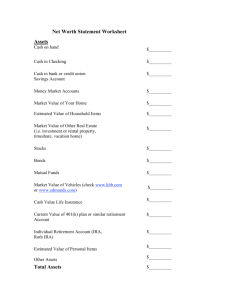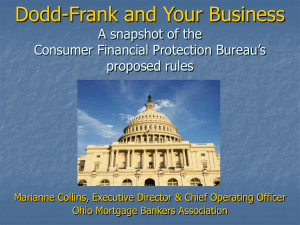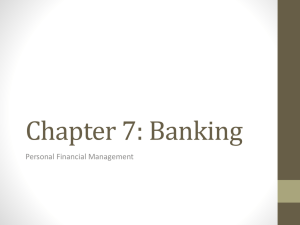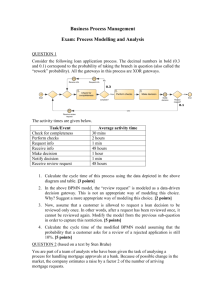Consumer Money Rates
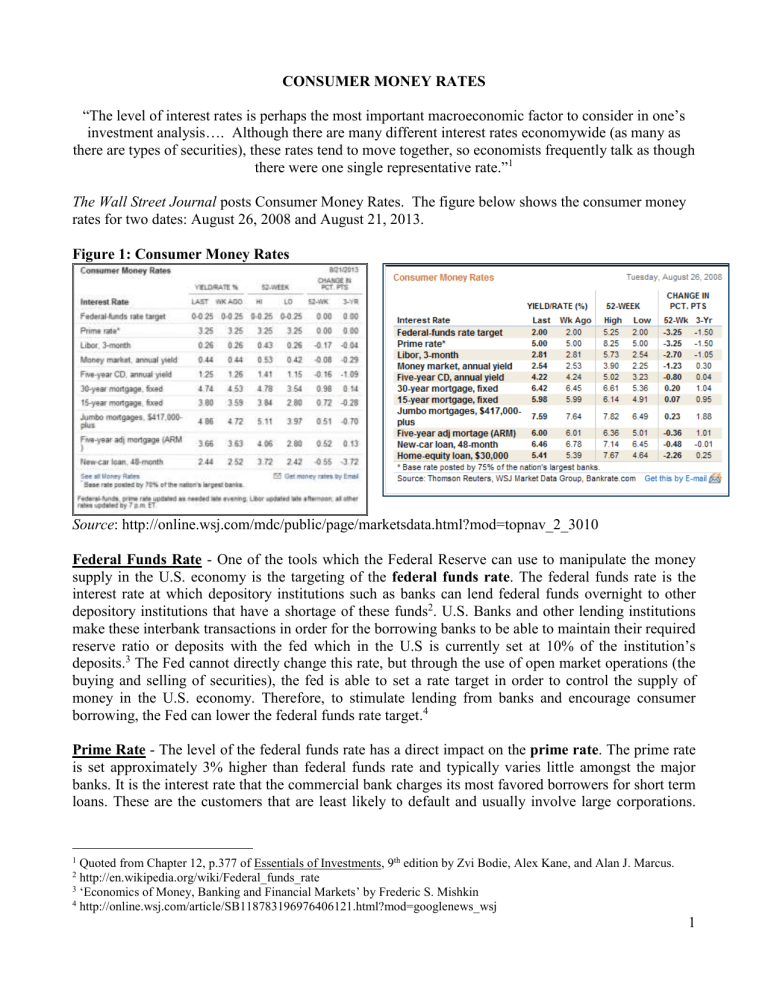
CONSUMER MONEY RATES
“The level of interest rates is perhaps the most important macroeconomic factor to consider in one’s investment analysis…. Although there are many different interest rates economywide (as many as there are types of securities), these rates tend to move together, so economists frequently talk as though there were one single representative rate.”
1
The Wall Street Journal posts Consumer Money Rates. The figure below shows the consumer money rates for two dates: August 26, 2008 and August 21, 2013.
Figure 1: Consumer Money Rates
Source : http://online.wsj.com/mdc/public/page/marketsdata.html?mod=topnav_2_3010
Federal Funds Rate - One of the tools which the Federal Reserve can use to manipulate the money supply in the U.S. economy is the targeting of the federal funds rate . The federal funds rate is the interest rate at which depository institutions such as banks can lend federal funds overnight to other depository institutions that have a shortage of these funds
2
. U.S. Banks and other lending institutions make these interbank transactions in order for the borrowing banks to be able to maintain their required reserve ratio or deposits with the fed which in the U.S is currently set at 10% of the institution’s deposits.
3
The Fed cannot directly change this rate, but through the use of open market operations (the buying and selling of securities), the fed is able to set a rate target in order to control the supply of money in the U.S. economy. Therefore, to stimulate lending from banks and encourage consumer borrowing, the Fed can lower the federal funds rate target.
4
Prime Rate - The level of the federal funds rate has a direct impact on the prime rate . The prime rate is set approximately 3% higher than federal funds rate and typically varies little amongst the major banks. It is the interest rate that the commercial bank charges its most favored borrowers for short term loans. These are the customers that are least likely to default and usually involve large corporations.
1 Quoted from Chapter 12, p.377 of Essentials of Investments, 9 th edition by Zvi Bodie, Alex Kane, and Alan J. Marcus.
2 http://en.wikipedia.org/wiki/Federal_funds_rate
3 ‘Economics of Money, Banking and Financial Markets’ by Frederic S. Mishkin
4 http://online.wsj.com/article/SB118783196976406121.html?mod=googlenews_wsj
1
Typically, those with a greater chance of defaulting on a loan are charged a higher rate of interest than the prime rate.
5
LIBOR - Another interbank interest rate is the London Interbank Offered Rate (LIBOR) . The
LIBOR is a short term interest rate that is fixed daily by a trade association called the British Banker’s
Association, consisting of a group of collaborative banks operating in the U.K. These banks determine the filtered average rate, or the LIBOR, for the lending of funds of the most credit-worthy banks to other similarly credit-worthy banks in the London interbank market.
6
The LIBOR is widely used as a reference rate across the world, including the USA, in order to determine the rates for adjustable rate loans and credit card debt.
7
Money Market - The money market interest rate is the rate at which short term debt securities are traded in an active market. A money market consists of financial instruments such as treasury bills, certificates of deposits (CD’s) and commercial paper that have short maturities and provide very liquid capital. Money markets typically yield low but safe interest rates for investors that invest directly in them.
8
CD - Banks and other lending institutions also offer certificates of deposits (CD’s) that allow investors to deposit a large sum of money for a fixed period of time to receive a higher rate of interest relative to savings accounts and money markets that allow withdrawals before the maturity date. CDs are low risk investments and investor is able to benefit from earning interest upon interest through compounding.
9
Fixed Rate Mortgage - Another form of interest rate is the fixed rate mortgage (FRM) . Those interested in buying a home are able to obtain financing in the form of a mortgage loan that allows the owner of the mortgage to pay back the amount as a series of installments over a fixed period of time, usually 15 or 30 years. FRM’s offer the borrower the security of fixed monthly payments, determined when the mortgage is taken out, for the entire duration of the mortgage. This initial price or rate of the
FRM is usually calculated by adding a certain percentage as margin to the price of an index rate such as the prime rate.
10
Jumbo Mortgages - For large loans that are above the conforming limits of $417,000 offered for conventional mortgages, jumbo mortgages are available for borrowers. Fannie Mae and Freddie Mac, two government sponsored enterprises that purchase the majority of residential mortgages in the US, set this conforming limit and anything above this limit is covered by large insurance agencies and banks. The interest rate for jumbo loans, is typically a certain percentage higher than the regular mortgage loans due to the greater possibility of default of the borrower and therefore greater risk associated for the lender.
11
Adjustable Rate Mortgage - The adjustable rate mortgage (ARM) on the other hand is a mortgage loan whereby the borrower pays a variable rate of interest payments on the loan. The interest rate is
5 http://en.wikipedia.org/wiki/Prime_rate
6 http://www.investopedia.com/terms/l/libor.asp
7 http://useconomy.about.com/od/glossary/g/LIBOR.htm
8 http://www.investopedia.com/terms/m/moneymarket.asp
9 http://en.wikipedia.org/wiki/Certificate_of_deposit
10 http://en.wikipedia.org/wiki/Fixed_rate_mortgage
11 http://online.wsj.com/mdc/public/page/marketsdata.html?mod=topnav_2_3010&refresh=on
2
closely tied to an index rate such as U.S. treasury bills or the LIBOR. Like the FRM, the ARM rate consists of an index value plus a certain percentage as margin, however, since the index value varies constantly, the adjustable interest rates also vary when the rates are reset usually monthly, semiannually or annually depending on the conditions of the mortgage. These rate changes on both
ARMs and FRMs are highly correlated with the U.S. treasury bills yield curve.
12
These mortgages are regularly offered to customers with lower interest rates but with the added risk of variable interest rates that could later be higher than FRMs depending on the free market. In 2006 accelerating ARM interest rates resulted in borrowers defaulting on mortgages as the rates became unaffordable, starting a trend of events that eventually resulted in the worldwide subprime crisis.
13
New Car Loan - Similar to the mortgage loan, borrowers interested in obtaining financing in order to purchase a new car can obtain a new-car loan. The duration of these loans is usually shorter in length and the interest rate for the loan is usually fixed for the entire duration of the loan. The interest rate is calculated similarly to the FRMs, where the rate fluctuates with changes in the short and intermediate term government treasury bills.
14
,
15
Home Equity Loan - In a home equity loan , the borrower is able to take loans out using the equity of their own home, the difference between the market value of the home and the unpaid balance of the mortgage as collateral. Interest rates on these loans are fixed involving a combination of the prime rate and a certain percentage as a margin.
16
Graduate Assistant Anant Wadhwa, Clark University, contributed to completion of this document.
12 http://www.investopedia.com/articles/pf/07/mortgage_rate.asp
13 http://en.wikipedia.org/wiki/Subprime_mortgage_crisis
14 http://www.lendingtree.com/smartborrower/Car-loan/Auto-loans--Interest-rates.aspx
15 http://en.wikipedia.org/wiki/Loan
16 http://en.wikipedia.org/wiki/Home_Equity_Loan
3

